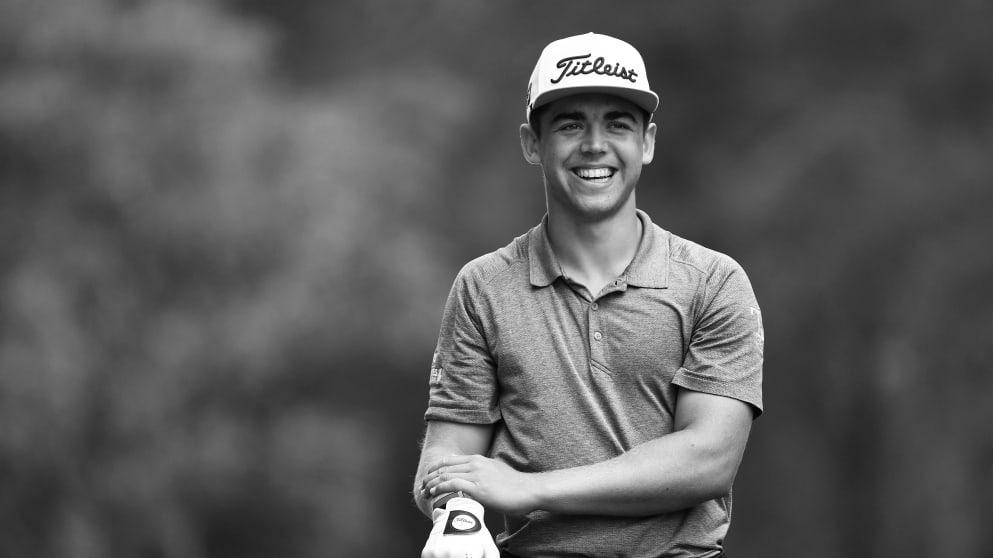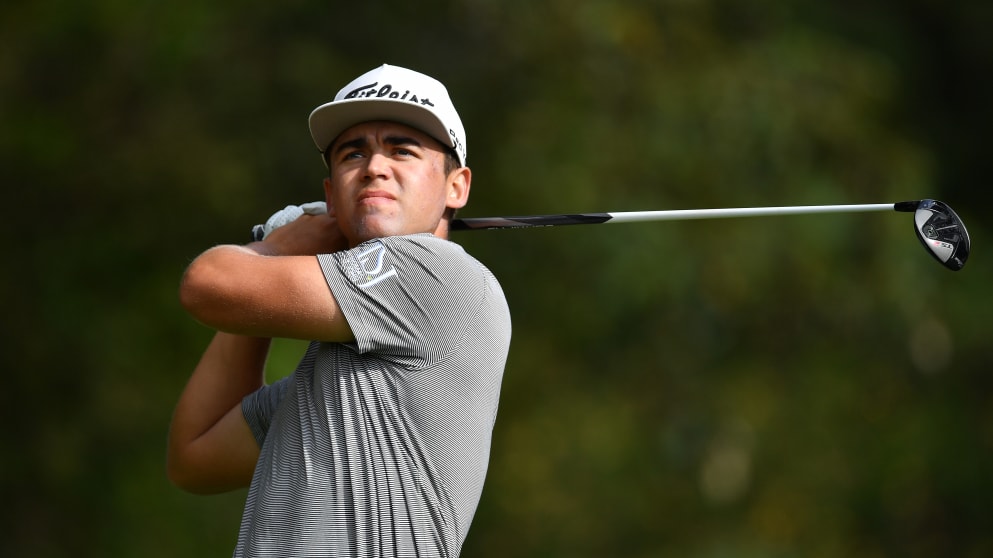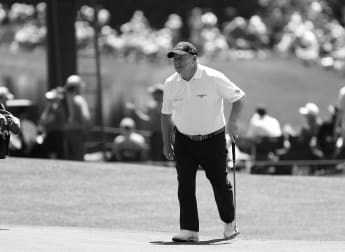In this week’s Player Blog presented by Enterprise Rent-A-Car, Garrick Higgo reflects on amateur golf, a fast start to his professional career and having a long-time supporter in Gary Player

I started playing golf when I was about three years old. I would just go out with my dad when he played, and I’m not sure why, but when I started playing it was with plastic golf clubs and I just naturally went to play left-handed. I’ve done it ever since – even though I’m actually right-handed. I also kick and throw left-handed but play tennis right-handed, so I’m not sure why that is, but it’s interesting that it’s true for a couple of other guys out on Tour like Phil Mickelson.
Even though I played golf growing up, I was never really that serious about it until I was 13 years old and I broke my elbow playing rugby. It pushed the decision a lot because I had to take a year off from playing golf, and my mum was like ‘you’ve probably got to choose what sport you want to play’. I’d always enjoyed how individual golf was, and that was probably when I made the decision to work really hard at it.
Because I started taking it seriously a little later, I wasn’t that good when I started joining teams as an amateur. I don’t think I really started playing well until I was about 16, and then by 17 I got to be the Number One amateur in South Africa.
I then went out to college in Las Vegas when I was 18, but I was only there for two semesters before I decided to come home. I’d been doing well in South Africa before that, but I just didn’t play well and fell off the radar. I felt like I was good enough to turn pro, but I also didn’t feel like I had the right support system over there in the United States as I did back home, and I knew that was vital to me.
It was a tough decision, and I knew it was a risk. I wasn’t playing well and because of that I knew I wasn’t going to get any sponsors, or any invites, and I already had a few credits so I knew I was making the decision to give up a degree without knowing whether I was going to make it. I accepted that, and I didn’t put pressure on myself because I knew it was risk, but I also knew I had to give it a go and find out if I could make it or I’d regret a lot of things.

To get my first win on the Big Easy Tour so quickly was such a nice feeling, because a lot of people didn’t think I should turn even professional. When I came back to South Africa after college people were like ‘why are you doing that’, and I wasn’t even winning amateur events so they questioned why I was turning pro. But I didn’t feel like there was any point trying to get back to the number one amateur in South Africa because I’d already done that, and I knew I’d see my coach more, so I thought I might as well try. But then I turned pro and won my first event on the Big Easy Tour, got my Sunshine Tour card through Qualifying School and won in my third event there, and then got my Challenge Tour card through European Tour Qualifying School all in the same year.
I never thought I’d be here so quickly, but I think the lack of expectation has in a way been a bit of an advantage. I was Number One in South Africa but I didn’t have the best amateur career: I never cracked the amateur top 100 and I didn’t play well at all in the U.S. Amateur or British Amateur, so I didn’t expect to do as well as I did. Even when I turned pro I said to my family that I was looking forward to climbing the ladder, and making my way by playing on the Big Easy Tour, then the Sunshine Tour.
I then won the Tour Championship on the Sunshine Tour, which was my last event before we had lockdown. I really worked hard at home, and I was grateful because I knew that my Challenge Tour status would get me in to co-sanctioned events, but I also knew that with the categories frozen, the only way to get my card was to win.
I was really proud of the way I came out and played in Austria last year to restart the season, and then how I played in Portugal during my win, because of the way it helped me to earn my European Tour card. It obviously wasn’t the biggest event, but it really felt like one because of what was at stake, and I really played well to get it done.
One of the people I spoke to after my victory was Gary Player, who has meant a lot to me throughout my life. We met when I was young because my family used to live in Plettenberg Bay and he had a house there, and I used to play nine holes with him quite a bit. My dad passed away when I was nine, and I remember he sent me a letter, because his mum had passed away when he was the same age. He’s been such a support since then and has sent me a lot of letters throughout the years, or called me at times to help, like phoning me to talk through the course the night before I played Oakland Hills as an amateur – because he won the US PGA Championship there in 1972.
Even right after I won in Portugal he phoned me, and after I missed cuts on the Challenge Tour in 2019 we had a long chat. He’s been incredibly nice to me, and we’ve played a few times since then, and I feel very lucky for that.
He’s definitely a unique character, and I know he doesn’t always get the best press, but I personally don’t feel he gets enough credit for what he achieved himself in the game. He also does so much for a lot players, and I know its not just been me over the years he has supported, and I have a lot of respect for him.
.@garrick_higgo was 9 in this photo. Yesterday he won his first @EuropeanTour event. It was only his 7th start on the Tour. I’ve worked closely with Garrick and I’ve had the pleasure of watching his game develop to where it is now. Big things to come from this young man. pic.twitter.com/DOna0BCHKK
— GARY PLAYER (@garyplayer) September 21, 2020
The South African players have always been great to me too. I stayed with Ernie Els for Spring Break when I was at college, and the guys out here on Tour have been really good to me, playing practice rounds with me and things.
It’s been great to see guys I grew up with come out and play well too. It’s funny though, because Wilco Nienaber and I have known each other since we were little, but it didn’t feel like we were ever the best amateurs and here we are. Jayden (Schaper) has been good since he was little and won all the big events though, so it’s nice to see him come through too.
South African golf is in a very good place right now, and I think it’s because the Sunshine Tour is incredibly competitive. I think you also learn a lot on that Tour in terms of travel and making money, but South Africans are tough, and I think that when we have opportunities, we are just good at taking them.

For the rest of this year, I’m just really hoping to make the most of my opportunities and play as much as I can. I never really set any goals in terms of where I want to get to but I certainly want to keep playing well, and get back to how I was playing this time last year. Now that I’ve got a win, I’m going to try to get another, and hopefully I can play my way into a couple of Rolex Series events and the DP World Tour Championship at the end of the year. It was an unreal experience last year, I learnt a lot, and it would be nice to do it again.










